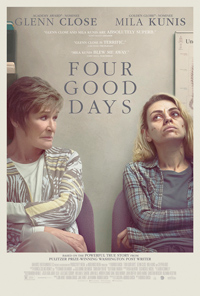My Opioid Teacher: Garcia Tackles Addiction in Hokey Reunion with Close
 Films dealing with drug addiction may have evolved considering the changing landscape of substance abuse, but a historical pratfall has often included an aura of emotional exploitation, particularly in examples from well-heeled sources. Rodrigo Garcia throws his hat into the ring with his latest feature, Four Good Days, co-written by Eli Saslow and headlined by Glenn Close, who assisted in bolstering the director’s repute in early films like Things You Can Tell Just by Looking at Her (2000) and Nine Lives (2005).
Films dealing with drug addiction may have evolved considering the changing landscape of substance abuse, but a historical pratfall has often included an aura of emotional exploitation, particularly in examples from well-heeled sources. Rodrigo Garcia throws his hat into the ring with his latest feature, Four Good Days, co-written by Eli Saslow and headlined by Glenn Close, who assisted in bolstering the director’s repute in early films like Things You Can Tell Just by Looking at Her (2000) and Nine Lives (2005).
Notably, Close earned an Academy Award nomination for their last union, with the 2011 labor of love Albert Nobbs. Their ongoing collaboration has reached a point of diminishing returns in a fourth outing which, though featuring two strong lead performances, is a ham-fisted blunder of a narrative as concerns the realities of trauma and addiction.
Deb (Close), who lives a comfortable life working as a massage therapist at Pechanga, finds her routine upended once again when her estranged daughter Molly (Mila Kunis) shows up at her doorstep begging to come home. Initially, Deb refuses to assist, having dealt with her daughter’s drug addictions for the past decade, brought about when she was only seventeen following an abused prescription of Oxycontin. But something about Molly suggests she might finally be ready to change. Agreeing to drop her off at detox, which Molly has attended fourteen times before, Deb finds herself in a bind she wanted to avoid. A physician suggests a new treatment, a monthly shot which will inhibit Molly from experiencing the effects of opioids, making her immune to their effects and allowing for an actual chance to wean herself. The only catch is, she must be clean for a week to take the medication safely. So, for four days, Molly is left in the charge of Deb, trying to avoid traumas and triggers as a light at the end of the tunnel presents itself.
It’s difficult to fault an actor the caliber of Close, who imbues Deb with all the requisite nonverbals to suggest this is a performance which belongs in a better film. Likewise, Kunis matches her co-star’s intensity as the down and out Molly. Their energies tend to elevate the film’s maudlin tendencies in a narrative which eventually begins to seem nonsensical. Unable to rest in the discomfort of propinquity, Garcia and Saslow devise a series of unrealistic ventures outside the comfort of Deb’s home to exploit anxiety and heighten tension, which ultimately absorbs a running time which would have been better spent fleshing out characterization. Several emotional beats are compromised, such as an otherwise well-delivered monologue from Kunis, by the unrealistic situations in which they occur. Arguably, how Close and Kunis are styled tends to distract as well, as nothing really solidifies their familial resemblance.
What Four Good Days needed was a hothouse intensity, much like Marsha Norman’s play ‘night Mother, adapted in 1986 starring Sissy Spacek and Anne Bancroft. Instead, Garcia seems to be aping classic film moments, like when Deb ferociously screams at an ambivalent nurse a la Shirley MacLaine in Terms of Endearment (1983). Rather than highlighting how the healthcare system in the US not only contributes to disparities but also sometimes carelessly administers assistance to those most in need, Deb and Molly’s rudimentary showdowns tend to displace the emphasis. Some notables in the supporting cast include peripheral characters played by Stephen Root and Joshua Leonard, who don’t have too much screen time to accomplish much. A greater sacrilege is a throwaway moment featuring Michael Hyatt (Nightcrawler; The Little Things) in a self-help group confessional.
★★/☆☆☆☆☆


